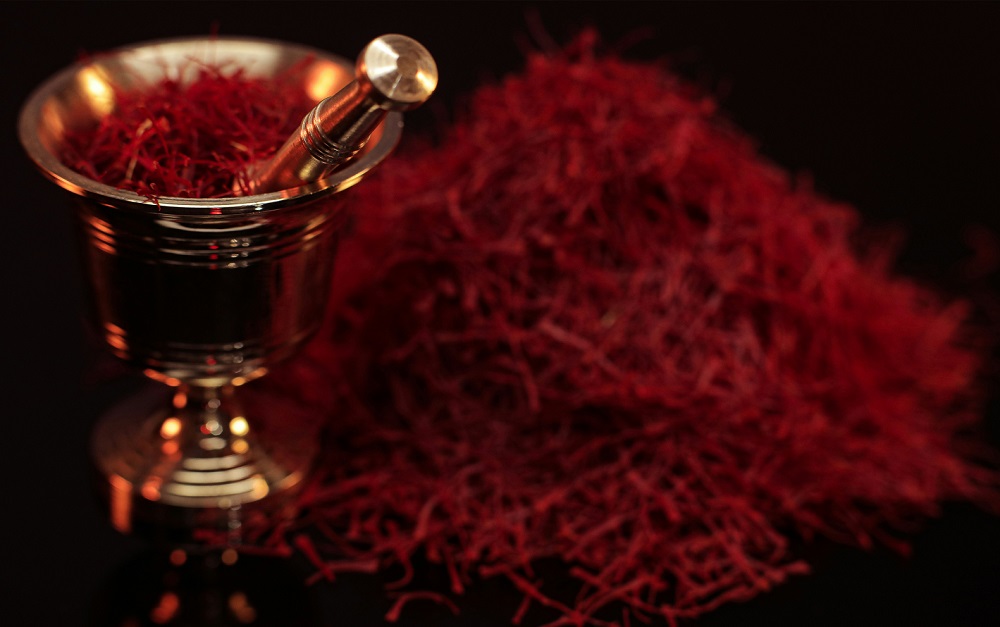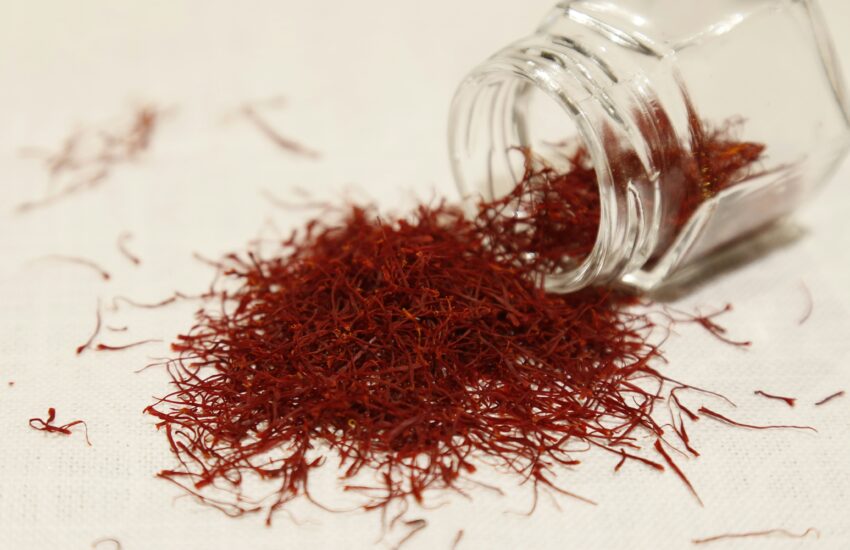“Saffron,” known as “Kesar” in Hindi and other languages, is a precious spice derived from the flower of Crocus sativus, commonly found in regions such as Iran, India, and Greece. It is highly valued for its vibrant color, distinct aroma, and numerous health benefits. Saffron threads are harvested by hand, making it one of the most expensive spices in the world due to its labor-intensive cultivation process. Each flower yields only a few strands of saffron, which are carefully dried to preserve their potency. Accordingly Mohit Tandon from USA, 15 Health Benefits of Saffron (Kesar) are as follows:
Antioxidant Protection:
Saffron is rich in carotenoids such as crocin, crocetin, and safranal, which act as potent antioxidants. These compounds help neutralize free radicals, which are harmful molecules that can damage cells and contribute to aging and various diseases. By reducing oxidative stress, saffron supports overall cellular health and longevity.
Anti-Inflammatory Effects:
Especially, Saffron exhibits strong anti-inflammatory properties, attributed primarily to its bioactive components. Inflammation is a natural immune response, but chronic inflammation can lead to diseases such as arthritis, cardiovascular disorders, and neurodegenerative conditions. Saffron’s ability to inhibit inflammatory markers and pathways helps mitigate inflammation and its detrimental effects on the body.
Mood Enhancement and Anti-depressant Properties:
Surely, One of the most well-known traditional uses of saffron is its mood-enhancing effects. Research suggests that saffron may help alleviate symptoms of mild to moderate depression. It is believed to modulate neurotransmitters in the brain, such as serotonin and dopamine, which play key roles in regulating mood and emotions. Regular consumption of saffron may contribute to improved mental well-being and emotional stability. – Mohit Tandon USA

Aphrodisiac Properties:
Saffron has been historically revered as an aphrodisiac, known to enhance libido and improve sexual function. It is believed to stimulate blood flow to the pelvic area and increase sensitivity and arousal. These effects make saffron a valued natural remedy for enhancing sexual desire and performance.
Cognitive Function and Neuroprotection:
The antioxidant and anti-inflammatory properties of saffron contribute to its potential neuroprotective effects. Saffron compounds like crocin and crocetin have shown promise in protecting brain cells from oxidative stress and inflammation, which are implicated in neurodegenerative disorders such as Alzheimer’s disease and Parkinson’s disease. Studies indicate that saffron may improve memory, learning ability, and cognitive function overall.
Eye Health:
Saffron contains carotenoids like crocin and crocetin, which have been linked to benefits for eye health. These compounds may help protect the retina from oxidative damage and reduce the risk of age-related macular degeneration (AMD), a leading cause of vision loss in older adults. Regular consumption of saffron may support overall eye health and visual acuity. – Mohit Tandon USA
Heart Health:
Saffron has potential benefits for cardiovascular health due to its ability to improve lipid profiles and reduce oxidative stress and inflammation. Studies suggest that saffron may help lower cholesterol levels, triglycerides, and blood pressure, which are important risk factors for heart disease. By promoting heart health, saffron contributes to a reduced risk of cardiovascular disorders.
Anti-cancer Properties:
Emerging research indicates that saffron may possess anti-cancer properties, although more studies are needed to fully understand its mechanisms and efficacy. Preliminary studies suggest that saffron extracts may inhibit the growth of cancer cells and induce apoptosis (programmed cell death) in various types of cancer, including breast, lung, colon, and skin cancers. The antioxidant and anti-inflammatory effects of saffron contribute to its potential as a natural cancer-fighting agent.
Digestive Health:
Saffron has been traditionally used to promote digestive health and alleviate gastrointestinal disorders. It is believed to have carminative properties, which can help reduce bloating, gas, and indigestion. Additionally, saffron’s anti-inflammatory effects may soothe the digestive tract and support overall digestive function.
Anti-diabetic Effects:
Research suggests that saffron may have beneficial effects on blood sugar levels and insulin sensitivity, making it potentially useful for managing diabetes. Studies have shown that saffron extracts may help lower fasting blood glucose levels and improve glucose metabolism. By regulating blood sugar levels, saffron may contribute to better glycemic control and reduce the risk of complications associated with diabetes.
Liver Protection:
Saffron may offer protective effects against liver damage and support liver function. Research indicates that saffron extracts may help prevent liver injury caused by toxins and oxidative stress. By enhancing antioxidant defenses and reducing inflammation in the liver, saffron supports liver health and detoxification processes.
Respiratory Health:
Saffron has been traditionally used to alleviate respiratory conditions such as asthma and coughs. Its anti-inflammatory properties may help reduce airway inflammation and improve respiratory function. Saffron extracts have shown potential in easing symptoms of asthma and enhancing lung function, although more research is needed to confirm these benefits.
Immune Support:
The antioxidant properties of saffron contribute to its immune-modulating effects. By protecting immune cells from oxidative damage, saffron helps maintain a healthy immune system. This may result in enhanced resistance to infections and improved immune response to pathogens.
Skin Health:
Especially, Saffron has been used in traditional medicine for its potential benefits for skin health. It is believed to have anti-inflammatory and antioxidant properties that can help reduce skin inflammation, promote wound healing, and protect against oxidative damage from UV radiation and environmental stressors. Saffron extracts are also used in skincare products for their potential anti-aging effects.
Weight Management:
Some studies suggest that saffron may have potential benefits for weight management and appetite control. It is believed to influence neurotransmitters involved in hunger and satiety, which may help reduce food cravings and calorie intake. By promoting a feeling of fullness and satisfaction, saffron may support efforts to maintain a healthy weight.
How to use Kesar
Consuming saffron (kesar) can be a delightful and beneficial addition to your diet, whether you’re using it for its culinary flavors or its medicinal properties. Here are several common methods for consuming saffron:
1. Infusion or Tea:
- Method: Steep a few strands of saffron in hot water (not boiling) for 5-10 minutes. Cover the cup or pot to retain the volatile compounds. The water will turn into a vibrant yellow or orange color.
- Benefits: Saffron tea is known for its calming effects and may help alleviate anxiety and improve mood. It’s also a pleasant way to enjoy the aroma and taste of saffron.
2. Direct Consumption:
- Method: Especially, Saffron threads can be directly consumed after soaking them in water or milk for a few hours to soften them. You can eat them as they are or mix them into foods like yogurt or smoothies.
- Benefits: Direct consumption ensures you get the full spectrum of nutrients and compounds present in saffron, which may support various health benefits such as antioxidant effects and mood enhancement.
3. Culinary Uses
- Method: Saffron is widely used in cooking to add color, flavor, and aroma to dishes. It’s commonly added to rice dishes like biryani, paella, and risotto, as well as desserts such as saffron milk, ice cream, and cakes.
- Benefits: Cooking with saffron not only enhances the taste of dishes but also allows the bioactive compounds in saffron to be released and absorbed during digestion.
4. Saffron Milk (Kesar Doodh):
- Method: Firstly Add a few strands of saffron to warm milk and let it steep for 10-15 minutes. Stir well to allow the saffron to dissolve and impart its color and flavor to the milk.
- Benefits: Saffron milk is a traditional remedy used for its calming properties and is often consumed before bedtime to promote relaxation and improve sleep quality. It’s also rich in nutrients like calcium, protein, and vitamins from the milk.
5. Supplements:
- Method: Saffron supplements are available in various forms, including capsules, powders, and extracts. Follow the dosage instructions provided by the manufacturer.
- Benefits: Supplements can be convenient for those looking to obtain the health benefits of saffron in a concentrated form. They are often standardized to contain specific amounts of active compounds like crocin and safranal.
6. Face Masks and Beauty Treatments:
- Method: Saffron can be used in face masks by mixing it with other natural ingredients like honey, yogurt, or milk. Apply the mixture to your face and leave it on for 15-20 minutes before rinsing off.
- Benefits: Saffron is believed to have antioxidant and anti-inflammatory properties that can help improve skin texture, tone, and overall complexion. It may also promote a radiant and youthful appearance.
When consuming saffron, it’s essential to use it in moderation due to its potent flavor and concentrated properties. Start with small amounts and gradually increase as per your preference and tolerance. Additionally, ensure you purchase high-quality saffron from reputable sources to reap its full benefits.
Conclusion:
In conclusion, saffron (Kesar) is not only valued for its culinary uses and distinct flavor but also for its numerous health benefits supported by scientific research. From antioxidant protection and anti-inflammatory effects to mood enhancement, cognitive support, and potential benefits for heart health, saffron emerges as a valuable natural remedy with multifaceted health-promoting properties. Integrating saffron into a balanced diet and lifestyle may contribute to overall well-being and longevity, although individual responses may vary.
